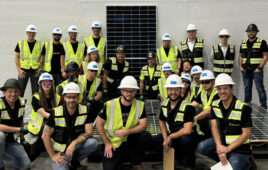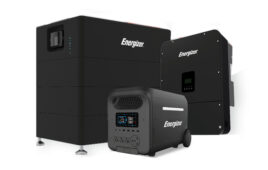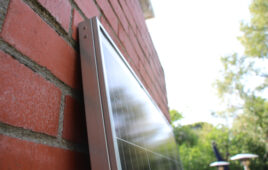Steel solar panel frame manufacturer Origami Solar announced that after months of independent testing at CFV Labs and the Renewable Energy Test Center (RETC), the company’s steel frames have passed frame-related industry-standard testing, including IEC 61215 static mechanical load testing and IEC 61701 salt-mist corrosion testing and continuity testing of equipotential bonding.
 This testing proves that module manufacturers considering switching from imported aluminum frames to domestic steel frames can pass certification testing with no concern.
This testing proves that module manufacturers considering switching from imported aluminum frames to domestic steel frames can pass certification testing with no concern.
CFV ran both required static load testing and optional test-to-failure tests. In the static mechanical load tests, modules using Origami’s steel frames comfortably met the standards demanded for IEC module certification. On a tracker with 400-mm bolts, the modules passed the IEC 61215-specified sequence of three cycles of one hour of down-push pressure and one hour of uplift pressure at pressure levels of +/- 2,400 Pa. When using quarter-point clamps along the module long-side, with racking below the module, the modules passed the same cycle times but with down-push pressure of 5,400 Pa and uplift pressure of 3,000 Pa. The modules comfortably passed all static mechanical load tests, meeting the IEC 61215 standard requirements.
While modules using Origami steel solar frames passed the required IEC 61215 tests, the test-to-failure runs further proved that the steel frames provide an ample safety margin, giving module makers further peace of mind. In fact, during some trials, even the maximum pressure allowed by CFV did not result in module breakage, which is important given the solar industry’s growing issue with decreased module strength.
“Over the last five years, CFV Labs has identified a decrease in module strength, both in laboratory testing and in fielded module projects,” said Colin Sillerud, Vice President of Engineering at CFV Labs. “The steel-frame modules supplied by Origami to CFV for testing exhibited test-to-failure pressure values that were higher than similarly sized and constructed modules with aluminum frames. While CFV cannot say that laboratory tests translate directly to field performance, these results show a strong relative lab performance when compared to traditionally framed PV modules.”
RETC’s salt mist corrosion and continuity testing on modules using Origami’s steel solar frames demonstrated similarly successful results, confirming the significant corrosion protection performance of zinc-aluminum-magnesium coatings (Z-A-M). The test module underwent the most rigorous of the salt mist testing methods typically used for land-based solar (specifically, IEC 61701, Method Six) and passed, correlating to the highest land-based corrosivity category, C5. The testing sequence also included testing for continuity bonding both pre-and-post salt mist sequence, which the test module framed with Origami’s steel passed with no issues.
“As our modeling predicted, Origami steel module frames demonstrated excellent performance across the full range of certification tests,” said Lauren Ahsler, Vice President of Engineering, P.E., S.E., at Origami Solar. “The tests prove to the industry that there is minimal risk to module makers’ ability to get modules certified when they switch to steel solar frames. These rigorous, third-party tests also show that switching to steel module frames has the potential to address the decrease in allowable loading specifications for large format modules and to improve overall PV plant reliability. The steel frames’ excellent performance in the salt-spray test sequence should resolve any concerns about corrosion protection. This independent testing demonstrates that Origami’s steel solar frames represent a big step forward for the solar industry.”
A detailed test plan is available here: https://origamisolar.com/test-program-doc-download/
News item from Origami Solar





Tell Us What You Think!